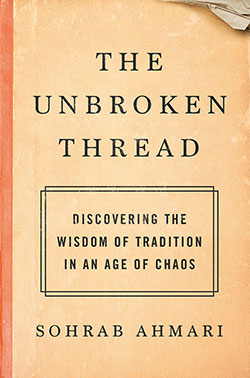Author offers ‘the wisdom of tradition’ to his son and us
By Sean Gallagher
 “In asking for baptism for your child, you are undertaking the responsibility of raising him in the faith, so that, keeping God’s commandments, he may love the Lord and their neighbor as Christ has taught us.
“In asking for baptism for your child, you are undertaking the responsibility of raising him in the faith, so that, keeping God’s commandments, he may love the Lord and their neighbor as Christ has taught us.
“Do you understand this responsibility?”
That’s a serious question at any time. Its gravity is increased even more so now for Catholics living in the midst of a culture growing more hostile to the faith every day.
This question should echo in the hearts and minds of Catholic parents as their children grow through the years.
With the help of God’s grace, they’ll carry out this responsibility in countless small ways every day in ordinary family life.
Sohrab Ahmari seems to have chosen a more extraordinary way of embracing this sacred duty. He wrote a book, The Unbroken Thread: Discovering the Wisdom of Tradition in an Age of Chaos (Convergent, 2021), for his young son Maximilian, whom he writes about in the introduction and addresses poignantly in a letter at the book’s end.
Ahmari poses 12 questions in the book that are either driving forces for today’s secular culture or which this culture seeks with great effort to avoid.
They include “Is God reasonable?’; “Can you be spiritual without being religious?”; “What is freedom for?”; “Is sex a private matter?”; and “What’s good about death?”
Ahmari takes up one question per chapter and seeks to answer it by exploring the life and thought of a historical figure.
Although a deeply committed Catholic—or perhaps because he is a deeply committed Catholic—Ahmari seeks answers to these questions from people far beyond the Catholic tradition.
Yes, there are chapters that highlight such Catholic figures as St. Augustine, St. Thomas Aquinas and St. John Henry Newman.
But he also calls upon Abraham Joshua Heschel, an influential 20th-century Jewish rabbi and scholar; Andrea Dworkin, a radical feminist who rose to prominence in the 1970s; and Confucius, an ancient Chinese thinker whose influence is still felt today.
The questions in the first half of the book explore humanity’s relationship with God. The last six questions address different aspects of what it means to be human.
And that points to a challenging responsibility for Catholic parents today. As if raising children well in the faith wasn’t challenging enough, parents in today’s culture have to pay special attention simply to forming their children to be authentically human.
In various questions that Ahmari delves into in his book, he shows how so much of what it truly means to be human is up for grabs today. Among other trends, prevailing public opinion not only affirms people’s right to choose a gender different from that with which they were born, but socially shuns in the “cancel culture” those who dare to openly question such a view.
Although such basic human formation may not have been at the front of parents’ minds in this way as little as 10 years ago, it’s still always been a fundamental part of raising children in the faith.
The bishops of the Second Vatican Council noted that “nothing genuinely human fails to raise an echo” in Catholics. That is because “only in the mystery of the incarnate Word does the mystery of man take on light.” It is Christ alone who “fully reveals man to man himself and makes his supreme calling clear” (“Gaudium et Spes,” #1, 22).
Ahmari throws himself into this daunting task as an engaging storyteller with intellectual heft who can draw a broad audience into what might otherwise seem, at least in some of the chapters, to be dry academic tales.
But it’s not just Ahmari’s mind and writing skills that helped him write this book. His own human journey and journey of faith also laid the groundwork.
Born in Iran in 1985 and raised as a nominal Muslim in the theocratic Islamic Republic, Ahmari moved to the U.S. with his mother when he was 13. From there, he dove headfirst into our secular culture. As a young adult, he began to discover, though, that an entirely materialist view of life gave unsatisfying answers to many basic questions that plagued him.
The search for authentic answers to these questions ultimately led him to embrace the Catholic faith and be baptized in 2016. He recounts his spiritual journey to the Church in From Fire, by Water: My Journey to the Catholic Faith (Ignatius Press, 2019).
God has blessed Maximilian abundantly in giving him a father who cares so deeply for him and his future. The rest of us in The Unbroken Thread just also happen providentially to be recipients of this blessing.
I highly recommend the book for people of all ages, but perhaps especially for youths and young adults in the Church and society as a whole who are increasingly tempted to embrace an exclusively secular view of life that seems to be the hallmark of our contemporary culture. †
